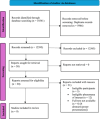Ayurveda for Managing Noncommunicable Diseases in Organisation for Economic Cooperation and Development Nations: A Qualitative Systematic Review
- PMID: 40201705
- PMCID: PMC11976450
- DOI: 10.1002/hsr2.70624
Ayurveda for Managing Noncommunicable Diseases in Organisation for Economic Cooperation and Development Nations: A Qualitative Systematic Review
Abstract
Background: Ayurveda, a traditional system of medicine, has gained recognition in the Organisation for Economic Cooperation and Development (OECD) countries as a complementary and alternative medicine for managing noncommunicable diseases (NCDs). Qualitative studies have been conducted in various OECD countries regarding the use of Ayurveda for NCD management. However, no qualitative systematic review has been conducted on this topic.
Aim: This review aimed to synthesize the experiences, perceptions, and perspectives of patients with NCDs and Ayurvedic practitioners on the use of Ayurveda for NCD management in OECD countries.
Methods: The JBI qualitative systematic review guidelines were followed. Several databases were searched to identify published and unpublished qualitative studies.
Results: Of the 18,541 records identified, 9 studies met the eligibility criteria and were included in the review. Using the JBI checklist for qualitative research (10 criteria), the critical appraisal scores of the studies ranged from moderate to high quality. Patients turned to Ayurveda because of concerns about side effects and dissatisfaction with conventional Western treatments and were driven by the perceived gentleness and holistic qualities of Ayurveda. Complementing these patient insights, Ayurvedic practitioners emphasized that Ayurveda identifies and addresses the root causes of diseases rather than treating symptoms alone. Integration challenges, limited medication access, and regulatory constraints were identified as factors affecting Ayurveda's service delivery.
Conclusions: Patients preferred Ayurveda because of its natural approach and fewer side effects, whereas Ayurvedic practitioners valued its holistic approach. However, its wider acceptance has been hampered by hurdles such as regulatory barriers and limited access to medicines. Strategies to overcome some of the barriers identified in this review as well as to promote the strengths discussed in this review may facilitate the effective use of Ayurveda to manage NCDs in OECD countries. Trial Registration: PROSPERO, Registration No. CRD42023397952.
Keywords: Ayurveda; Organisation for Economic Cooperation and Development; management; noncommunicable diseases; qualitative systematic review.
© 2025 The Author(s). Health Science Reports published by Wiley Periodicals LLC.
Conflict of interest statement
The authors declare no conflicts of interest.
Figures
Similar articles
-
Ayurveda for managing noncommunicable diseases in organisation for economic co-operation and development: A qualitative systematic review protocol on experiences, perceptions, and perspectives of ayurvedic practitioners and patients.Health Sci Rep. 2023 Sep 14;6(9):e1530. doi: 10.1002/hsr2.1530. eCollection 2023 Sep. Health Sci Rep. 2023. PMID: 37720168 Free PMC article.
-
Beyond the black stump: rapid reviews of health research issues affecting regional, rural and remote Australia.Med J Aust. 2020 Dec;213 Suppl 11:S3-S32.e1. doi: 10.5694/mja2.50881. Med J Aust. 2020. PMID: 33314144
-
Barriers and facilitators to physical activity among ethnic Chinese children: a qualitative systematic review.JBI Evid Synth. 2020 Dec;18(12):2445-2511. doi: 10.11124/JBISRIR-D-19-00154. JBI Evid Synth. 2020. PMID: 32833787
-
A Scoping Review of Ayurveda Studies in Women with Polycystic Ovary Syndrome.J Integr Complement Med. 2023 Sep;29(9):550-561. doi: 10.1089/jicm.2022.0754. Epub 2023 Mar 21. J Integr Complement Med. 2023. PMID: 36944117
-
Wellness or medicine? Use and perception of Ayurveda in Germany: data from an online-representative cross-sectional study.Front Med (Lausanne). 2024 May 22;11:1408609. doi: 10.3389/fmed.2024.1408609. eCollection 2024. Front Med (Lausanne). 2024. PMID: 38841569 Free PMC article.
References
-
- Jamison D. T., Summers L. H., Alleyne G., et al., “Global Health 2035: A World Converging Within a Generation,” Lancet 382, no. 9908 (2013): 1898–1955. - PubMed
-
- Nugent R., Bertram M. Y., Jan S., et al., “Investing in Non‐Communicable Disease Prevention and Management to Advance the Sustainable Development Goals,” Lancet 391, no. 10134 (2018): 2029–2035. - PubMed
-
- The Organisation for Economic Co‐Operation and Development, “UNIATF/OECD Work on Responding to the Challenge of NCDs,” cited September 15, 2022, https://www-oecd-org.nottingham.idm.oclc.org/health/UNIATF-OECD-Brochure....
Publication types
LinkOut - more resources
Full Text Sources
Miscellaneous


